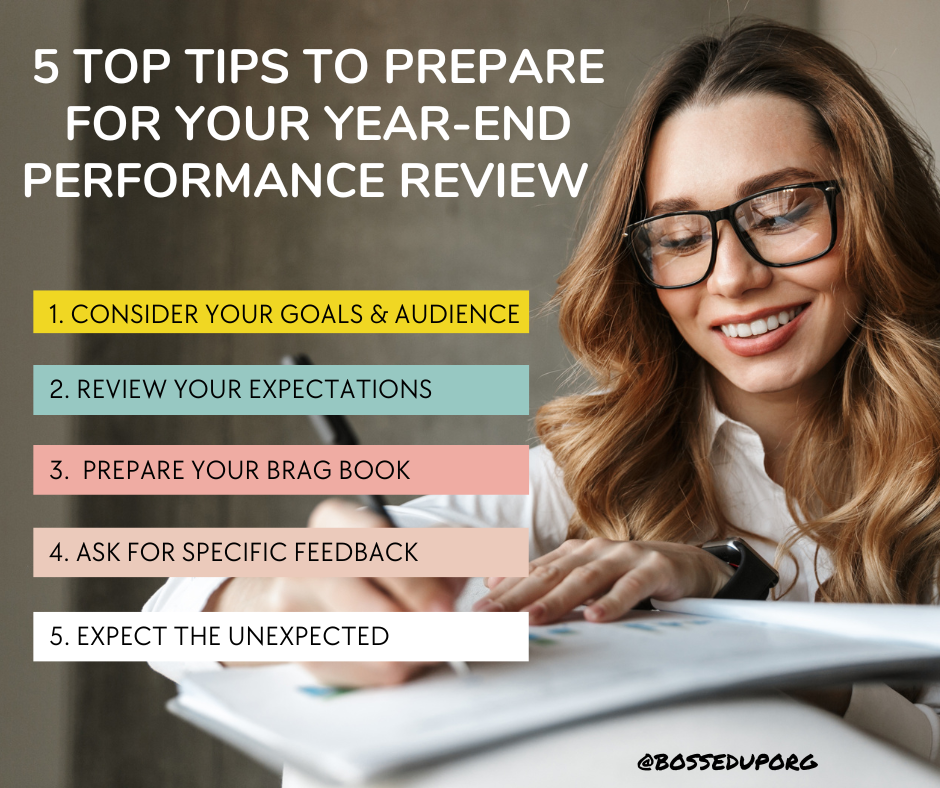5 Top Tips to Prepare for Your Year-End Performance Review
Episode 374 | Author: Emilie Aries
Now that we’re well into Q4, many of us are beginning to prepare for year-end performance reviews. Whether you've already started the formal review process at your organization, or if you work somewhere that has no formal system in place, I encourage you to think critically about how to make a performance review best serve you.
Today I want to focus on how to navigate your performance review when you are the one in the hot seat. Here are 5 tips I want you to keep in mind when preparing for any year-end performance review.
1. CONSIDER YOUR GOALS & AUDIENCE
This is the time to embrace the key principle of persuasive communication:consider your goals and your audience. Persuasive communication always boils down to being goal-oriented and audience-centered.
What does that look like in the context of a performance review? First, think about your goals. What are your goals going into this review season? What are you aiming for in your career and your life?
Maybe you want more work-life balance or more schedule predictability. Maybe you want a more manageable workload. Do you need more staff on your team? Maybe you want clarity when it comes to expectations and deliverables or more regular opportunities to get feedback. Maybe you want growth in your career.
As a side note, be careful about words like “growth,” because that isn't specific enough. You may say “growth,” and you might need professional development resources that you can use to grow your skills, but your manager might hear, “Oh, you want more responsibility? Yeah, I can give you growth, no problem.”
Don't leave it up to interpretation! Be specific. What are you actually looking for when you say “growth,”or any of those kinds of terms, including “work-life balance.”Do you want more money, more responsibility, more promotion, more professional development funds, more coaching, or more mentorship?
If you don't do the mental work of taking a stab at what you think you want, then you leave it in the hands of someone else to figure it out.While we as human beings are not the best at predicting what will make us happy, it's better you predict that for yourself than someone else.
Step into the driver's seat and take the wheel when it comes to directing your career forward when asking for what you need to pursue your career goals. It looks like we cut out the entire section here where I talk about knowing your audience. Can you add that back in? It’s needed to round out the whole goals & audience focus of this first section.
This sets you up to show that you're someone who believes in constant growth. Someone who is self-motivated and who really wants to continuously improve.
For example, lot of the clients I work with in our Level Up leadership accelerator, are laying the groundwork for a promotion all year long by having conversations that might not be formal HR-documented conversations, but conversations where they're essentially asking their bosses what they need to do to land a promotion by the end of the year.
I encourage you to have these types of conversations early and often, and keep in mind that at the end of the day, even though these can feel like very bureaucratic processes, there are still human beings making these decisions. And wherever there are human beings making decisions, things are more flexible than they might seem.
2. REVIEW YOUR OWN EXPECTATIONS
My second tip for preparing to make the most of your year-end performance review is to clarify your own expectations. I want you to review the fundamental expectations of your role and ask yourself what your boss expects of you.
I have an entire podcast episode that dives into how to set clear expectations for your team members. At Bossed Up, we use a system that I share in this podcast called “Tasks and Standards.” We're very explicit about everything that needs to happen in order for our world to keep turning.
Before our performance review, I encourage all of our team members to review their own tasks and standards for their role. What are the strategic KPIs, OKRs, or goals that you’ve been driving towards all year long? Did you achieve them? When measurable objectives and goals are clearly set ahead of time, this should be a fairly straightforward process.
If you operate in conditions that are very clear like that, do your best to objectively evaluate how you are measuring up. Did you meet 50% of your goals this year? Or did you exceed all your goals this year? Really reflect holistically on all the tasks, all the objectives, all the measurable ways that you can prove that you've been successful, and see where there are gaps.
3. PREPARE YOUR BRAG BOOK
You’re going to want to go into this conversation with your brag book prepared. We have a resource all about how to prepare a brag book, and how it can help you navigate any kind of a performance review, interview situation, or promotion path. Check it out here.
A brag book is simply a place - a document or folder you keep - where you track your biggest achievements, your standout projects, or any superlative words of praise shared about you by clients, colleagues, or the stakeholders that you serve.
When you combine all of that perception -- praise or social proof -- with your actual performance metrics, the objectives you’ve met or the goals you’ve exceeded, then you can go into your performance review with a really well-rounded picture that you can paint for your boss.
Just keep in mind that you want to try to connect your braggables in your brag book to the expectations of your job. If you're not hitting any of your sales goals, but you're saying, “Look at all these happy customers' words of satisfaction,” that might not be a well-rounded case to make in your performance review.
4. ASK FOR SPECIFIC FEEDBACK
It’s hard to prepare a brag book if you haven’t received specific feedback all year long, right? If that’s the case for you, I want you to bring this up in your meeting with your boss and request that they provide you with specific feedback moving forward.
For instance, “How do you become an effective communicator?” or “What resources do you recommend for how to be a more polished and effective communicator?”
If this is a self-identified area of growth, don't be shy about asking your manager for their support in closing those skill gaps. After all, a good manager's job is to set you up for success. I go into more detail in a previous podcast episode - feel free to listen if you want to learn more.
5. EXPECT THE UNEXPECTED
Finally: expect the unexpected. That can be hard because the fact of the matter is you don't want a surprise when it comes to your year-end performance review unless it's a happy surprise, right?
More often than not, I hear from folks who are absolutely shocked by the feedback that comes up at the end of the year. Bombs are dropped that seem to have never come up all year long, then all of a sudden your manager has words of feedback for how you can improve this huge thing you've been doing incorrectly.
All year long, people are conflict-avoidant. People are scared and not good at giving radically candid feedback, especially in a lot of (corporate) cultures that aren’t very psychologically safe.
Knowing that people are innately conflict-avoidant, I want you to go into your performance review emotionally prepared to be surprised. If you get some tough feedback that you don't see coming, how do you want to react?
First, think about how you would react to a stressful situation like that. Do you tend to get defensive and get that fight version of the fight or flight mode? Do you start to cry?
I want you to think of replacing that behavior and follow these steps:
Take a deep breath
Plaster a smile on your face - even if it feels a little forced at the moment.
Have some go-to lines ready to help buy yourself timelike,
“I really appreciate you bringing that up.”
“I'm gonna have to think more about that and get back to you.”
“I recognize that this is actually the first I'm hearing of this, so I'm gonna need some time to think about it and get back to you.”
“Can we circle back on this at a later date? I'd love to continue this conversation when I've had more time to think about it and process this.”
When we're in a stressful flight or fight mode, it's really hard to think clearly. No one can begrudge you for needing a little bit of time, especially if this is surprising news. So have some of those lines in your back pocket written on a sticky note to help you buy some time.
At the end of the day, keep in mind that when you’re preparing for any kind of a performance review and especially a year-end performance review, these five strategies can help you go in feeling cool, calm, collected, and ready to make your case for whatever it is that you want.
Keep these boss tips in your back pocket and I know you'll be successful in moving your career and life forward. If you’re ready to take the next step in your career, learn more about Level Up, our 6-month leadership accelerator that will give you all the tools you need to advance your leadership skills.
Got a career conundrum you want us to cover on the podcast? Call and leave us a voicemail NOW at 910-668-BOSS(2677).











